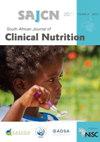An introduction to the Food-Based Dietary Guidelines for the Elderly in South Africa
IF 0.6
Q4 NUTRITION & DIETETICS
引用次数: 0
Abstract
Food-based dietary guidelines (FBDGs) are not a new concept and are being used in many countries to promote healthy eating and the prevention of diet-related chronic diseases. The Food and Agriculture Organization (FAO) recommended FBDGs as an approach to prevent malnutrition and promote healthy dietary behaviours in populations, taking into consideration local conditions, traditional dietary practices and socioeconomic and cultural factors whilst at the same time using evidence-based scientific principles. South Africa (SA) currently has two sets of guidelines, namely the paediatric food-based dietary guidelines and the South African FBDGs for the population aged seven years and older. The recognition that elderly malnutrition remains a major public health concern in SA led to the formulation of a specific set of guidelines for this vulnerable population group based on existing nutrition-related health issues, local dietary habits and barriers to food intake experienced by those aged 60 and above. This introductory paper on the development of the elderly food-based dietary guidelines (EFBDGs) will be followed by six technical papers motivating why these guidelines are suited to address nutrition-related issues among the elderly in SA.介绍南非老年人以食物为基础的膳食指南
基于食物的饮食指南(FBDG)并不是一个新概念,许多国家正在使用它来促进健康饮食和预防与饮食相关的慢性疾病。粮食及农业组织(粮农组织)建议将FBDG作为预防营养不良和促进人群健康饮食行为的一种方法,同时考虑到当地条件、传统饮食习惯以及社会经济和文化因素,同时使用循证科学原则。南非(SA)目前有两套指南,即针对7岁及以上人群的儿科食品膳食指南和南非FBDG。认识到老年人营养不良仍然是南非的一个主要公共卫生问题,因此根据现有的营养相关健康问题、当地饮食习惯和60岁及以上人群的食物摄入障碍,为这一弱势群体制定了一套具体的指导方针。这篇关于老年人饮食指南(EFBDG)制定的介绍性论文之后,将发表六篇技术论文,说明为什么这些指南适合解决南非老年人的营养相关问题。
本文章由计算机程序翻译,如有差异,请以英文原文为准。
求助全文
约1分钟内获得全文
求助全文
来源期刊

South African Journal of Clinical Nutrition
NUTRITION & DIETETICS-
CiteScore
2.50
自引率
9.10%
发文量
21
期刊介绍:
1.The Journal accepts articles from all basic and applied areas of dietetics and human nutrition, including clinical nutrition, community nutrition, food science, food policy, food service management, nutrition policy and public health nutrition. 2.The Journal has a broad interpretation of the field of nutrition and recognizes that there are many factors that determine nutritional status and that need to be the subject of scientific investigation and reported in the Journal. 3.The Journal seeks to serve a broad readership and to provide information that will be useful to the scientific community, the academic community, government and non-government stakeholders in the nutrition field, policy makers and industry.
 求助内容:
求助内容: 应助结果提醒方式:
应助结果提醒方式:


